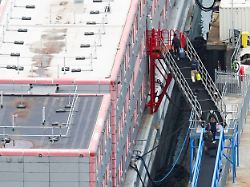Sunak saves on accommodation
The first asylum seekers move to a residential barge
8/8/2023 12:46 am
The British government wants to quarter 500 asylum seekers on the “Bibby Stockholm,” a barge that has been converted into a barge. Residents on the nearby island are up in arms, and human rights activists also have major concerns. Now the first migrants are moving in anyway.
A first group of asylum-seekers has found accommodation aboard the Bibby Stockholm, a huge barge off the coast of south-west England. The British government’s controversial project aims to save money on taking in refugees and deter potential asylum seekers. The new measure in immigration policy had drawn strong criticism from local residents and human rights activists.
The 93 meter long and 27 meter wide “Bibby Stockholm”, which has been anchored in Portland on the Dorset coast for weeks, took in the first residents after a series of delays. With its 222 cabins, the barge should offer space for up to 500 young male asylum seekers. The decision to dock the ship in Portland, a small island with a population of about 13,600, drew criticism from some local residents. In their opinion, the area is not suitable for the project. Some residents said they feared for their safety. Human rights activists have also voiced criticism of the project. The barge was unsuitable for the purpose of accommodating asylum seekers, among other things, the double rooms on the ship were far too narrow. In the past few weeks, demonstrators from both camps have appeared on the shore area.
The barge was used in the 1990s by Germany and later by the Netherlands to house asylum seekers and the homeless. Opponents of the project in Britain pointed out that it had previously been described as an “oppressive environment”. There are also massive concerns about fire safety. The firefighters’ union last week called for an urgent meeting with the Home Office over safety concerns. According to official sources, however, the barge passed all the necessary checks.
The British government has recently made increasing attempts to reduce the costs of accommodating asylum seekers. In recent years there has been a surge in refugees crossing the English Channel to Britain on board small boats. “The government believes it is right to find alternatives (to current housing) that are cheaper and more cost-effective,” a spokesman for Prime Minister Rishi Sunak told journalists. “We think this is an alternative.” According to research by the “Guardian”, the saving for accommodation on the freighter is almost ten British pounds per capita and day.
